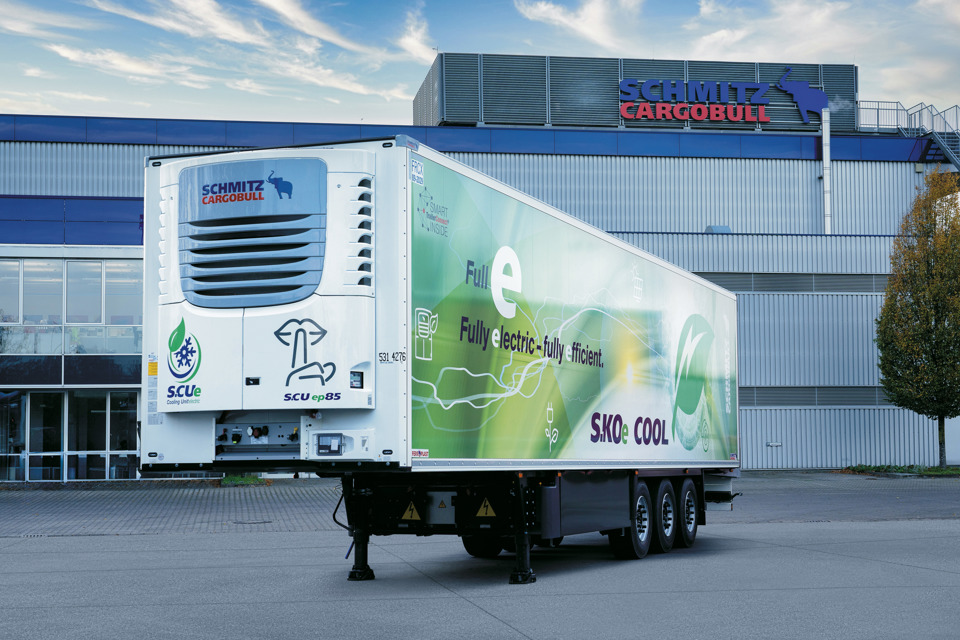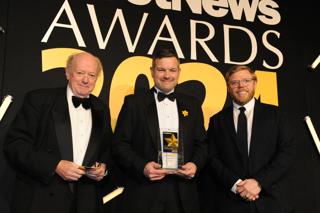Fleets hauling chilled and frozen goods in temperature-controlled trucks and semi-trailers have long been under pressure from their environmentally-aware customers to cut CO2 emissions from their fridges.
The government ban on the use of cheap red diesel as a fridge power source imposed in 2022 made it even more vital for them to consider other options given the comparatively high cost (and vulnerability to theft) of white diesel; and manufacturers of refrigeration systems have not been slow to promote zero-emission alternatives.
Some of these solutions have in fact been around for a little while.
Carrier Transicold introduced Vector eCool for refrigerated semi-trailers back in 2020.
It converts kinetic energy generated by the trailer axle and brakes which would otherwise be lost into electricity which is then stored in a battery pack to power the fridge.
This loop delivers a completely autonomous system that produces no direct NOx, particulate or CO2 emissions and is PIEK-certified as being able to operate at a noise level below 60 dB(A).
As a consequence it can be used on late-night or early-morning delivery work to premises close to housing without disturbing slumbering householders.
Fleets hauling chilled and frozen goods in temperature-controlled trucks and semi-trailers have long been under pressure from their environmentally-aware customers to cut CO2 emissions from their fridges.
The government ban on the use of cheap red diesel as a fridge power source imposed in 2022 made it even more vital for them to consider other options given the comparatively high cost (and vulnerability to theft) of white diesel; and manufacturers of refrigeration systems have not been slow to promote zero-emission alternatives.
Some of these solutions have in fact been around for a little while.
Carrier Transicold introduced Vector eCool for refrigerated semi-trailers back in 2020.
It converts kinetic energy generated by the trailer axle and brakes which would otherwise be lost into electricity which is then stored in a battery pack to power the fridge.
This loop delivers a completely autonomous system that produces no direct NOx, particulate or CO2 emissions and is PIEK-certified as being able to operate at a noise level below 60 dB(A).
As a consequence it can be used on late-night or early-morning delivery work to premises close to housing without disturbing slumbering householders.
When the trailer is parked but still loaded the battery can be plugged into an electricity supply, if one is available, using a standard five-pin three-phase standby plug. It can be recharged in two hours says Carrier.
While Carrier can claim to have pioneered the use of kinetic energy from axles to drive fridges, it is by no means the only company offering this type of package.
Rival Thermo King has headed in the same direction with Advancer AxlePower developed in conjunction with trailer axle and braking system manufacturer BPW.
At the time of writing it was on trial with trailer rental giant TIP fitted to a semi-trailer built by Chereau.
Last year saw Schmitz Cargobull launch the all-electric S.KOe COOL semi-trailer in the UK with a 20kW generator axle, a 32kWh lithium ion phosphate battery mounted between its landing legs and a 15.8kW electric S.CU ep85 cooling unit. It is roughly 200kg heavier than its diesel stable-mates.
Schmitz makes the fridge and the axles, including the e-axle, itself.
The e-axle enables the fridge to operate for up to five hours on fully-frozen work before the battery has to be connected to a three-phase mains electricity supply.
If it is on chilled work, however, then the charge from the e-axle could last for up to 18 hours.
With 17 trucks and 30 trailers, Marine & Cargo is one of the first UK operators to put one into service, and is pleased with its performance so far.
“We’re taking approximately 200 litres of diesel a week out of our operation which is what our standard refrigerated trailers will use to keep the cargo they’re carrying at the temperature it needs to be,” says managing director Andrew Marshall.
The trailer is being used solely on a contract with STI (UK) to deliver goods to McDonalds distribution centres across the UK.
Another option for trailers that has been developed by Carrier is Eco-Drive.
It uses a PTO (Power Take-Off) from the tractor unit’s engine to propel a variable-displacement Bosch hydraulic pump.
This in turn drives a generator which delivers 400v of continuous three-phase electrical power to keep the fridge running without any need to fire up a diesel donkey engine.
The same approach can be used to power fridges on rigids and works along similar lines to Ecogen, an engine PTO-driven electro-hydraulic package developed by Hultsteins.
The Swedish company also offers Ecofridge, a purely-hydraulic fridge which also relies on an engine PTO.
It propels a belt-driven constant-flow hydraulic pump which in turn powers a Hultsteins refrigeration system.
Opting for a package of this type means that the truck’s engine will use more fuel.
The economics still make sense however, Hultsteins contends, because Euro VI truck diesel engines are 43% to 46% efficient compared with 20% to 25% for a diesel fridge’s donkey engine.
Not that the truck’s engine has to be diesel-fuelled.
With 130 trucks and 220 trailers, temperature-controlled logistics specialist McCulla is using Ecogen in conjunction with a tractor unit powered by compressed natural gas (cng). The company produces its own, low CO2, biomethane in-house.
“We’ve been doing all this work on CNG trucks, which have far lower emissions than their diesel equivalents, yet we’ve been hauling around trailers with diesel fridges,” says operations director, Brian Beattie.
“However, we can now provide customers with a low-carbon-footprint tractor unit plus a fridge trailer with zero emissions.”
All the foregoing might suggest that companies like Carrier have ceased developing diesel-fired refrigeration systems.
However, this is not the case.
One of the latest additions to the Carrier range - the HE 17 fridge - is diesel-driven.
A key reason for its launch is the shortage of battery-charging facilities at many major distribution depots – and systems such as Vector eCool invariably require the batteries they rely on to be topped up from the grid.
While HE 17 may not be emission-free, Carrier contends that it has made every attempt to ensure that it is as clean and efficient as possible.
Fuel consumption is said to be down by as much as 30% when compared to the Vector 1550 fridge it succeeds.
This is in part the consequence of HE 17’s E-Drive 3.0 inverter technology which constantly adapts the compressor ’s speed to match the demand for cooling at any given time.
If the tractor unit hauling it is equipped with Eco-Drive then HE 17 can be powered electrically.
Should the tractor unit happen to be electric then Carrier can equip it with a system called eCoolDrive.
This converts the DC electricity it produces to three-phase AC which means the fridge can potentially be powered electrically using its standby socket while out on the highway.
The use of roof-mounted solar panels to power fridges is not being neglected.
A solar refrigeration package developed by UK-based clean technology start-up Sunswap under the Endurance banner is going into service on ten semi-trailers operated by DFDS.
The panels are said to be capable of charging up the battery it employs for 24 hours on frozen work, two days on multi-compartment chilled/frozen operations and no less than two months if the trailer is hauling chilled-only loads.
DFDS trialled Endurance in 2022. Sunswap says that the trial showed that fitting ten could remove 895 tonnes of CO2 and save around 500,000 litres of fuel over a decade compared with installing diesel fridges.
Furthermore, 71% of the operating costs of the fridges would be saved, Sunswap states.
Marshall Fleet Solutions has come up with Titan. It uses a battery which is charged up overnight and topped up during the working day using solar panels to drive the fridge.
A diesel donkey engine can be retained to provide back-up should the battery go flat despite the operator’s best efforts.
Food producer and distributor Samworth Brothers has had Titan fitted to 14 of its semi-trailers equipped with Thermo King Advancer A400 fridges.
General manager Alistair Leckie says: “It’s been operational for over a month, and we haven’t had to fill up with diesel yet.”
Carrier has been working on a fridge which employs a hydrogen fuel cell, while wind power is yet another environmentally-friendly means of running fridges (albeit an unlikely-sounding one), according to Hultsteins.
It has teamed up with Green Road Energy of the USA to offer the latter’s TAG – Turbine Auxiliary Generator – on this side of the Atlantic.
It can be mounted on either a truck or trailer chassis, and uses wind-turbine technology to generator electricity for tail-lifts, fridges, lighting and auxiliary batteries.
Food service provider Reynolds will soon have 15 Hultsteins Ecogens in service and is trialling two TAGs on temperature-controlled rigids.
The problem with some of the zero-emission solutions offered is that they can be up to 40% to 50% more expensive than a traditional diesel fridge.
However, steep front-end expenditure can in many cases be offset by low energy costs, and they often require less maintenance; and as the experiences of the operators cited above testify, they help to ensure a fleet’s carbon footprint shrinks.
By John Lewis
Login to continue reading.
This article is premium content. To view, please register for free or sign in to read it.



















Login to comment
Comments
No comments have been made yet.